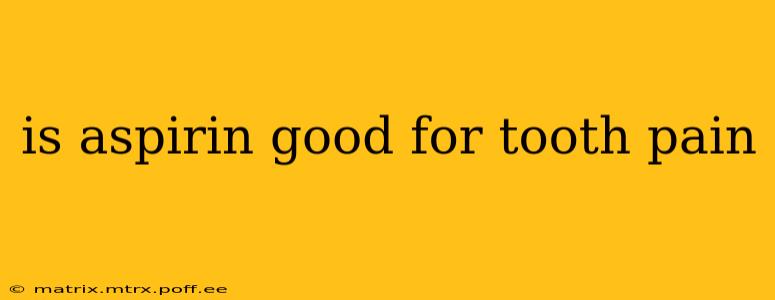Tooth pain is a common ailment, often striking unexpectedly and causing significant discomfort. Many people reach for over-the-counter pain relievers like aspirin in an attempt to find quick relief. But is aspirin truly a good solution for toothaches? The answer is nuanced and depends on several factors. While aspirin can offer temporary pain relief, it's not a cure and may not be the best option in all cases. This guide will explore the effectiveness of aspirin for tooth pain, its limitations, and safer alternatives.
Does Aspirin Reduce Toothache Pain?
Aspirin, a nonsteroidal anti-inflammatory drug (NSAID), works by reducing inflammation and blocking pain signals. For mild to moderate toothaches caused by inflammation, such as those stemming from gum irritation or a minor injury, aspirin can provide temporary relief. The pain-relieving effects are due to its ability to inhibit prostaglandins, chemicals in the body that contribute to inflammation and pain sensation. However, it's crucial to understand that aspirin only addresses the symptom (pain) and not the underlying cause of the toothache.
What Types of Tooth Pain Can Aspirin Help With?
Aspirin might provide temporary relief for toothaches resulting from:
- Minor gum irritation: Inflammation of the gums (gingivitis) can cause pain and discomfort. Aspirin's anti-inflammatory properties can help ease this pain.
- Minor oral injuries: A small cut or injury inside the mouth might cause pain. Aspirin can help reduce the inflammation and pain associated with such injuries.
- Post-dental procedure pain: In some cases, minor post-dental procedure pain might be alleviated by aspirin, but always follow your dentist's instructions regarding pain management.
When Should You NOT Use Aspirin for Tooth Pain?
Despite its potential for temporary relief, aspirin is not a suitable solution for all types of tooth pain. There are several situations where you should avoid using aspirin:
- Severe tooth pain: Intense, throbbing tooth pain usually indicates a serious underlying issue, such as an abscess or severe infection. Aspirin is inadequate for treating these conditions. You need professional dental care.
- Dental abscess: A dental abscess is a serious infection that requires immediate attention from a dentist. Taking aspirin without addressing the infection can worsen the situation.
- Children and teenagers: Aspirin should not be given to children and teenagers, as it can cause Reye's syndrome, a rare but potentially life-threatening condition. Use age-appropriate pain relievers recommended by a pediatrician or doctor.
- Allergies or sensitivities: If you have an allergy to aspirin or NSAIDs, avoid using it.
- Existing medical conditions: Individuals with certain medical conditions, such as stomach ulcers, bleeding disorders, or liver problems, should consult their doctor before taking aspirin.
What are the Side Effects of Using Aspirin for Tooth Pain?
While generally safe for short-term use in adults, aspirin can cause side effects, including:
- Stomach upset: This is a common side effect, potentially leading to heartburn, nausea, or stomach pain.
- Bleeding: Aspirin can increase the risk of bleeding, especially if you have a bleeding disorder or are taking other medications that thin the blood.
- Allergic reactions: Although rare, severe allergic reactions can occur, requiring immediate medical attention.
What are Better Alternatives for Tooth Pain Relief?
For most types of tooth pain, especially severe or persistent pain, it's essential to seek professional dental care. However, for mild, temporary pain, other over-the-counter pain relievers may be more appropriate:
- Ibuprofen (Advil, Motrin): Ibuprofen is another NSAID that can reduce inflammation and pain. It's often considered gentler on the stomach than aspirin.
- Acetaminophen (Tylenol): Acetaminophen is a pain reliever and fever reducer, but it doesn't reduce inflammation. It can be effective for pain but won't address inflammation-related toothaches.
Always follow the dosage instructions on the label and consult a doctor or dentist if you have any concerns.
Can I put Aspirin directly on my Tooth?
No, never apply aspirin directly to your tooth or gums. This can cause chemical burns and irritate the sensitive tissues in your mouth.
How Long Does it Take for Aspirin to Work for Tooth Pain?
The onset of pain relief from aspirin can vary depending on the individual and the severity of the pain. Generally, you should notice some relief within 30-60 minutes of taking the recommended dose. However, if your pain doesn't improve or worsens, seek professional dental care immediately.
Is Aspirin a Permanent Solution for Tooth Pain?
No. Aspirin only masks the symptoms of tooth pain. It doesn't address the underlying cause, which requires professional dental treatment. Using aspirin to treat persistent or severe tooth pain is inappropriate and could delay appropriate care, potentially worsening the condition.
In conclusion, while aspirin can provide temporary relief from mild toothaches caused by inflammation, it's crucial to understand its limitations and potential side effects. For any severe or persistent tooth pain, consult a dentist immediately for proper diagnosis and treatment. Don't rely solely on aspirin for managing tooth pain; it's not a long-term solution and could be detrimental to your oral health.
